2024 SDG 5 English
- 5.2.1 Percentage of Female First-Generation College Goers
- 5.3.1 Enrollment tracking measures
- 5.3.2 Female Application and Enrollment Policy
- 5.3.3 Guaranteed Quota Program for Women
- 5.3.4 Encouraging Applications from Underrepresented Female Subjects
- 5.4.1 Percentage of Senior Female Academics
- 5.5.1 Percentage of Female Degree Recipients
- 5.6.1 Non-Discrimination Against Women Policy
- 5.6.2 Transgender Non-Discrimination Policy
- 5.6.3 Maternity Policy
- 5.6.4 Student Child Care Facilities
- 5.6.5 Child Care Facilities for Staff
- 5.6.6 Women’s Counseling Program
- 5.6.7 Tracking Female Graduation Rate
- 5.6.8 Policy on protection of persons reporting discrimination
- 5.6.9 Paternity Policy
5.2.1 Percentage of Female First-Generation College Goers
In recent years, the number of students enrolled in higher education has risen nationwide, and the number of first-generation college-bound students from the 2019 through 2022 academic years has been decreasing. The proportion of first-generation college-bound females has also been decreasing.
The number of first-generation college-bound women and men who are the first in their immediate family to attend college for the entire semester (first and second) of the 2022 academic year.
【Female】 First generation to attend college: 115 people
【Male】 First generation to go to college: 144 people
【Combined】 First-generation college students: 259 people
college for the entire semester (first and second) of the 111th academic year.
【Female】 First generation to attend college: 115 people
【Male】 First generation to go to college: 144 people
【Combined】 First-generation college students: 259 people
Gender | 2019 School Year | 2020 School Year | 2021 School Year | 2022 School Year |
Female | 235(52%) | 187(50%) | 122(46%) | 115(44%) |
Male | 218(48%) | 189(50%) | 141(54%) | 144(55%) |
Total | 453 | 376 | 263 | 259 |
5.3.1 Enrollment tracking measures
1.The University tracks female students’ enrollment, application, and joint entrance examination distribution rate yearly. When tracking the number of students enrolled in the University, the number of students applying for enrollment, and the number of students distributed in the last four years, from the 2019 to the 2024 academic year, the number of females exceeded 50%, and the percentage of enrollment was higher than that of males.
The statistics of the number of male and female students enrolled in the University in the 2019 to 2022 academic years are summarized in the table below:
Gender | 2019 School Year | 2020 School Year | 2021 School Year | 2022 School Year |
Female | 971(54%) | 953(53%) | 979(53%) | 976(53%) |
Male | 816(46%) | 847(47%) | 876(47%) | 853(47%) |
Total | 1787 | 1800 | 1855 | 1829 |
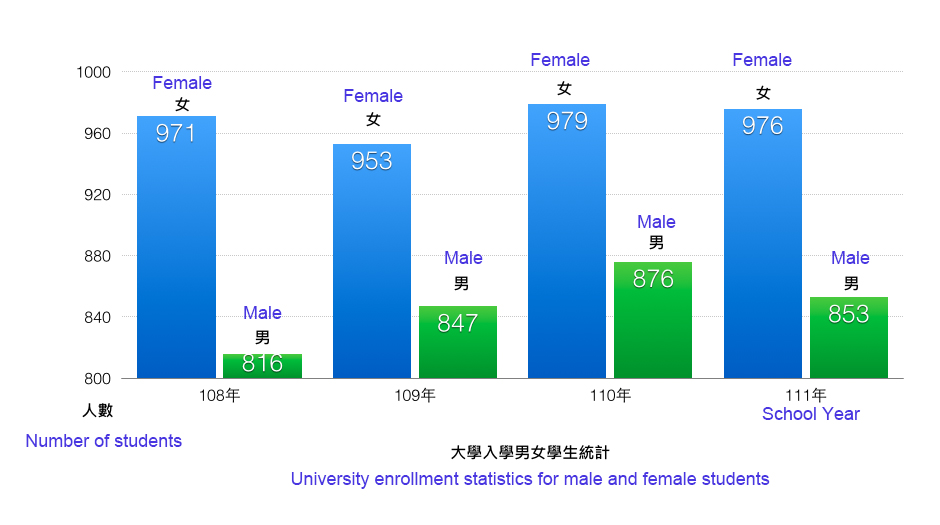
Statistics on the number of male and female students applying for admission to universities in the 2019-2022 academic year are summarized in the table below:
Gender | 2019 School Year | 2020 School Year | 2021 School Year | 2022 School Year |
Female | 435(58%) | 396(55%) | 399(56%) | 409(57%) |
Male | 315(42%) | 327(45%) | 316(44%) | 597(43%) |
Total | 750 | 723 | 715 | 716 |
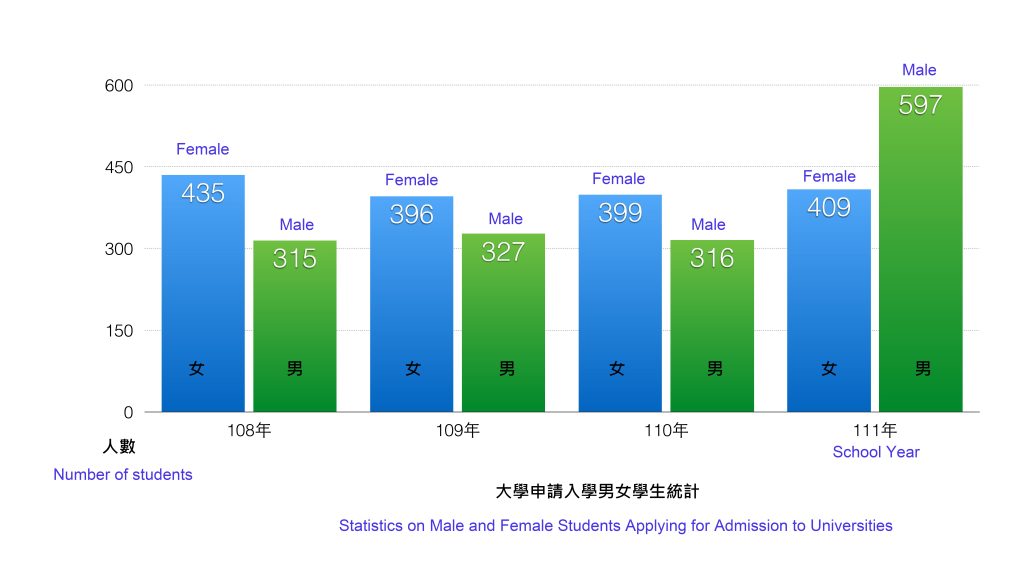
The Joint Entrance Examination distribution rate has declined due to childlessness as follows.
Gender | 2019 School Year | 2020 School Year | 2021 School Year | 2022 School Year |
Female | 271(55%) | 262(50%) | 299(55%) | 288(49.8%) |
Male | 253(45%) | 264(50%) | 249(45%) | 290(49.2%) |
Total | 524 | 526 | 548 | 578 |
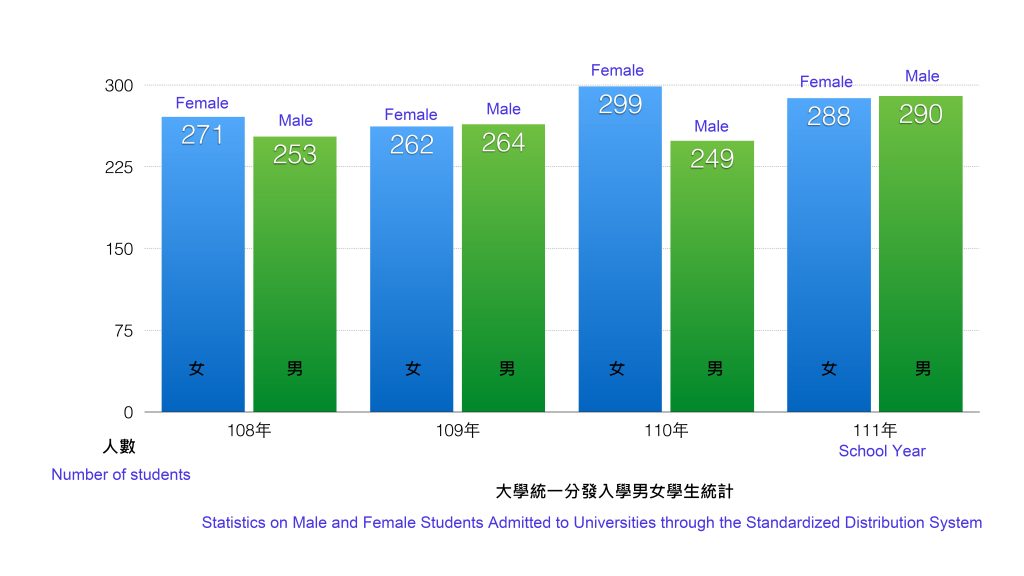
5.3.2 Female Application and Enrollment Policy
1. To promote gender equality on campus, prevent and handle gender discrimination, sexual assault, and sexual harassment, and protect the rights of faculty, staff, and students in a safe, educational environment, the National Taiwan Normal University Gender Equality Education Committee was established, and a dedicated website was set up to include gender equality laws and regulations, channels for filing complaints, procedures for dealing with incidents, an emergency phone number, and information on teaching resources and activities.
The fourth point of the “Implementation Points of Gender Equality Education of the National Taiwan Normal University” stipulates that there shall be no differential treatment of gender, sex characteristics, gender identity, or sexual orientation in the admission and enrollment of students. In addition, Points 2, 5, and 10 of the Guidelines for the Implementation of Gender Equality Education stipulate that students should respect different genders when participating in studies and activities and should not be treated differently based on gender in terms of welfare and services in teaching, activities, etc., and that staff training, continuing education programs, and new student training should be included in the content of gender equality education.
2. Point 7 of the “Key Points for the Implementation of Gender Equality Education at National Taiwan Normal University” stipulates that the university will actively protect pregnant staff’s right to work and education of pregnant students and provide necessary assistance. In addition, Articles 10 and 21 of the Academic Regulations stipulate that to encourage women to apply for admission to the university, the rights and interests of pregnant students who have given birth or are raising children under the age of three are fully protected in the admission process.
3. To protect the safety of female students and staff and to enhance participation in campus life, the University has a “ Sexual Harassment Prevention and Control Corner ” with various regulations, complaint guidelines, and contact information.
4. The school has formulated the “Measures for the Prevention and Handling of Sex Discrimination, Sexual Assault, Sexual Harassment or Sexual Bullying” to actively protect the educational rights of pregnant students and to assist pregnant students in their childcare needs after giving birth or giving birth to their children through referrals to the school or to the community.
5. In order to promote gender equality on campus, prevent and handle gender discrimination, sexual assault and sexual harassment, and protect the rights of faculty, staff, and students in a safe educational environment, the National Taiwan Normal University Gender Equality Education Committee was established, and a dedicated website was set up to include gender equality laws and regulations, channels for filing complaints, procedures for dealing with incidents, an emergency phone number, and information on teaching resources and activities.
5.3.3 Guaranteed Quota Program for Women
1.Point 5 of the “Key Points for Implementing Gender Equality Education at National Taiwan Normal University” states that “female students shall be guaranteed equal opportunities to receive scholarships.” and point 7 states that “the university shall actively protect the work rights of pregnant staff and the rights of pregnant students to receive education and provide necessary assistance. The seventh point of the program states, “The university shall actively protect the right to work of pregnant faculty and staff and the right to education of pregnant students and provide necessary assistance. In addition, the offices of each department provide female students with information and counseling on scholarships.
2.The University has established gender research awards and scholarships that prioritize women/gender researchers. For example, the “Ms. Yvonne Kan Scholarship” has been offered annually since 2016, with a $15,000 per student award. The “Mrs. Wong Mothers Cheung Scholarship” provides three female students with $10,000 per academic year.
3.The University’s “Dreams Come True Scholarship” is open to pregnant students and students who are supporting children under the age of three. Each student receives a scholarship of NT$10,000 to NT$20,000.
4.In order to build a friendly environment for childbearing, the school’s full-time teachers are required to follow the school’s “Notes on Hourly Fee for Teacher’s Leave of Absence”when they are on maternity leave, on leave without pay for childcare, on sick leave to accommodate a baby, on prenatal leave, on abortion leave, on paternity leave, and on paternity leave.
5.3.4 Encouraging Applications from Underrepresented Female Subjects
1.Since 2012, the Departments of Chemistry and Life Sciences have organized an annual “Science Education Tour Program for High School Girls.” The Ministry of Education commissions the program and cooperates with a private organization, the Wu Chien-Hsiung Academic Foundation, to invite Taiwan women scientists of the past years to give lectures on the subjects of Physics, Chemistry, and Biology, etc. Each year, the number of women who have participated in the program is about 1,600, and the number of participants in this program has reached more than 10,000 over the last 10 years. The number of female students participating in the program is about 1,600 annually. It has been in operation for 10 years, with more than 10,000 students participating in the program, and the total number of schools visited is nearly 40.

2.The Department of Mathematics of the University organizes the “Enhancement of Female Students’ Interest in Science Learning in Elementary and Secondary Schools Project,” which focuses on enhancing female students’ interest in the fields of science and mathematics, and plans five activities, including lesson plan development and seminars, one-day camps (both physical and online), YouTube videos, school presentations, and article writing.
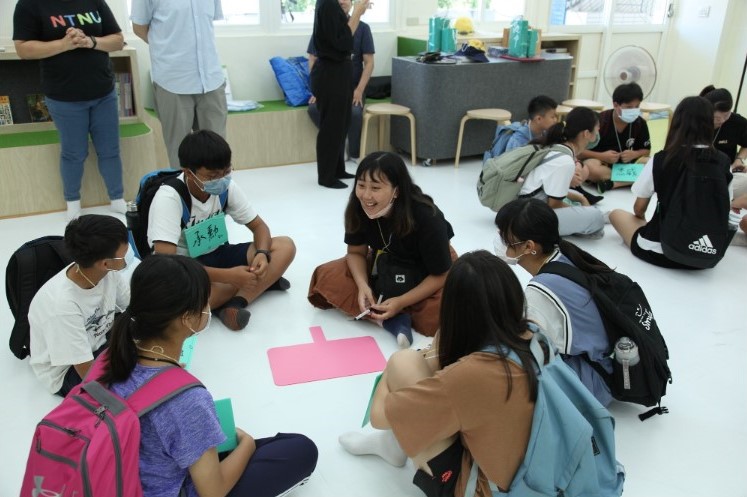
3.The R&D Department of the University encourages students and faculty members in STEM fields and cross-disciplinary fields to participate in the Ministry of Education’s STEM field and female R&D talent cultivation program in colleges and universities to strengthen the establishment of a female-friendly learning environment for R&D and to cultivate R&D talents needed for industrial development.
4. Taiwan Normal University IOH Open Personal Experience Platform: In this platform, you can see Normal University seniors share their experiences and the secrets of each department, so that Taiwanese and overseas students can exchange their experiences with each other, and to attract students who are interested in Taiwanese schools to come to study.
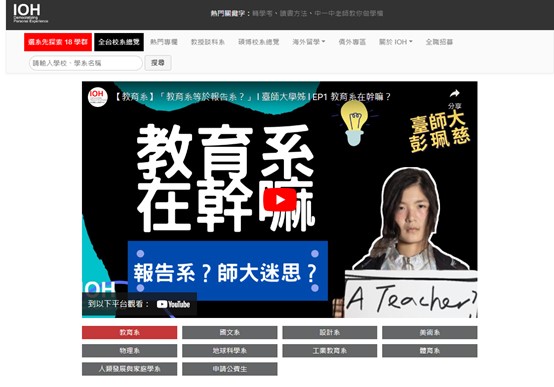
5.4.1 Percentage of Senior Female Academics
The total number of academics and female academics at NTNU are shown in the following table.
Total | Female | Male | |
1. Total number of full-time teachers | 847 | 359 | 488 |
2. Number of full-time professors | 470 | 182 | 288 |
3. Number of administrative or academic supervisors (including one or two ranks) | 195 | 57 | 138 |
Name | 2022 | 2023 |
Number of Teaching Staff | 849 | 847 |
Number of academic staff | 493 | 470 |
Number of female academic staff | 186 | 182 |
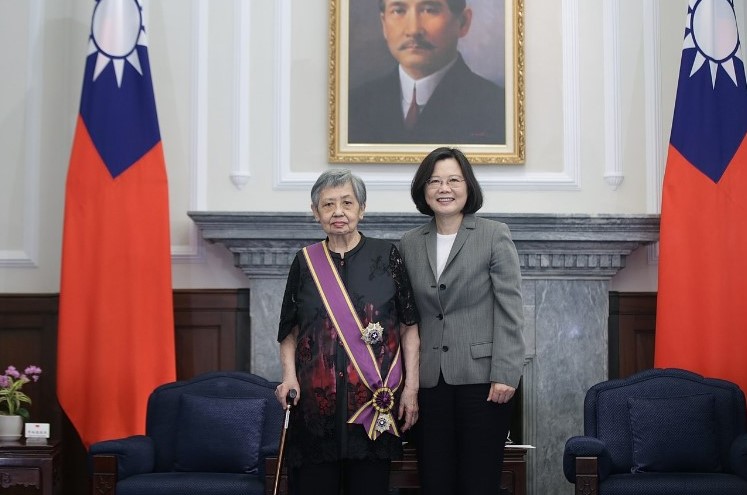
5.5.1 Percentage of Female Degree Recipients
There are 3,605 graduates in the whole academic year of the 2022 school year, and the total number of females is 2,054, accounting for 56.98% of the total number of graduates. The Humanities, Social Sciences, and Arts fields had 1,273 students, accounting for 66.61% of the total. There are 355 students in the STEM field, accounting for 33.94% of the total students. There are 65 students in the medical field (including the Department of Health Education, Master of Biomedical Sciences, and Master of Science in Nutrition), accounting for 74.71% of the total number of students.
Area | Total number of female degree recipients | Total number of degree recipients | Percentage of women |
Humanities, Society, Arts | 1,273 | 1911 | 66.61% |
STEM | 355人 | 1046 | 33.94% |
Medicine (including Department of Health Education, Master of Biomedical Sciences, Master of Nutrition) | 65人 | 87 | 74.71% |
Other | 361 | 561 | 64.35% |
Total | 2054 | 3605 | 56.98% |
5.6.1 Non-Discrimination Against Women Policy
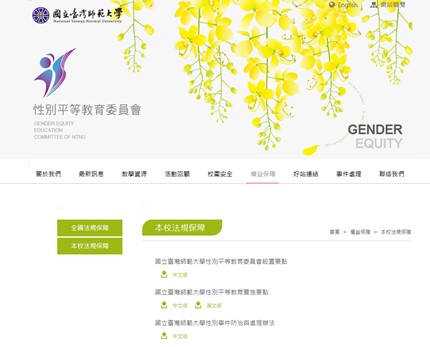
1.In 1997, in order to promote the establishment of the concept of gender equality and to prevent and handle incidents of gender discrimination, sexual behavior, and sexual harassment, (NTNU) established the Committee on Gender Equality.
On November 30, 2005, the Committee on Gender Equality Education (CGE) set up its key points, and on June 22, 2011, the Committee revised its “Key Points for Implementing Gender Equality Education”.
2.In 2019, the National Taiwan Normal University (NTNU) will formulate the “ Key Points for Implementing Gender Equality Education ”: Point 5 stipulates that the appointment, enrollment, and admission of school personnel shall not be based on gender or sexual orientation.Point 10 stipulates that pre-service education, training for new recruits, on-the-job training, training programs for administrators and new students should be included in gender equality education.
In addition , points 3, 4, 6-9 also specify the establishment of a gender-friendly and safe campus space, enrollment and admission, teaching, activities, evaluation, selection, promotion, assessment, rewards and punishments, welfare and services, the right to work and the right to receive education for pregnant faculty and staff members, the establishment of gender-related research programs, and budgeting.
3.In order to prevent and deal with incidents of sexual assault and harassment or sexual bullying on campus, the “Measures for Prevention and Handling of Sexual Discrimination, Sexual Assault, Sexual Harassment, and Sexual Bullying” were formulated in 2017 to promote prevention and education and publicity work.
4.To prevent and deal with the occurrence of sex discrimination, sexual abuse, and sexual harassment in schools, eliminate sex discrimination, and uphold the dignity of the human personality, the school has compiled a handbook on gender equality education.
5.6.2 Transgender Non-Discrimination Policy
1.In 2017, to promote the concept of gender equality, strengthen education on gender equality, promote substantive equality of gender status, and protect the rights and interests of faculty, staff, and students from sex discrimination, sexual abuse, sexual harassment, or sexual bullying, the University formulated the “Measures for the Prevention and Handling of Sex Discrimination, Sexual Abuse, Sexual Harassment, or Sexual Bullying,” which has been revised several times and was recently amended to the year 2022, with the following article: “Respect the gender characteristics and sexual orientation of the faculty and staff. Article 4: Respect the gender characteristics and sexual orientation of staff and students, do not treat them unreasonably based on gender or sexual orientation, and actively assist disadvantaged students based on their gender or sexual orientation to promote substantive equality of gender status and eliminate gender discrimination.
2. Every year, the University organizes the “Gender Month—AILO Life Festival” to promote gender equality activities and call on the public to pay attention to gender issues through concerts, lectures, film exhibitions, and other diversified means.

3. Seminar on Gender Equality Education
In the 2023 university orientation, new students were given lectures on gender equality to help them understand the basic concepts of gender equality, legal knowledge, and attitudes towards life.
4. The first gender-friendly floor: The Gender Equality Education Committee of the University organizes public activities and promotes the establishment of gender-friendly dormitories and gender-friendly toilets to create a more friendly campus environment for students of different gender orientations. It is hoped that students who are disadvantaged due to unjustified discrimination based on sex, gender identity, gender identity or sexual orientation will feel supported on campus (TISU’s Gender Friendly Campus).
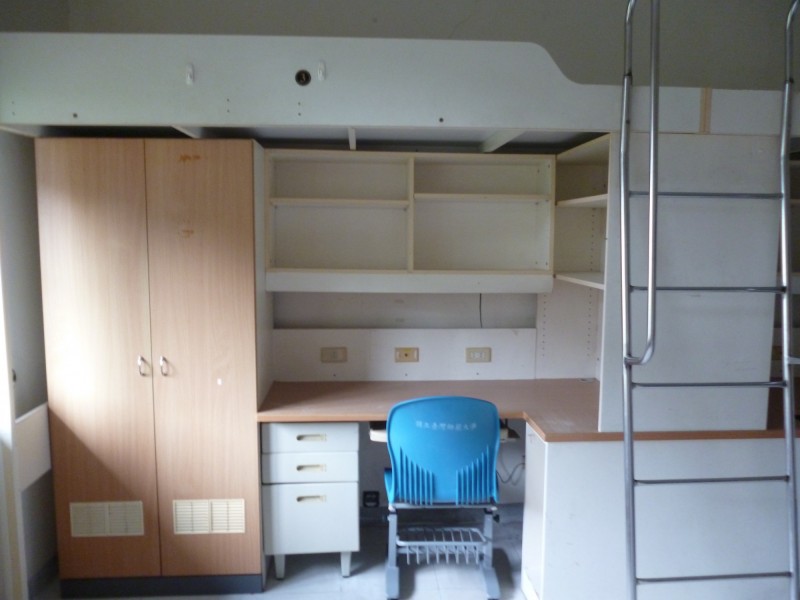
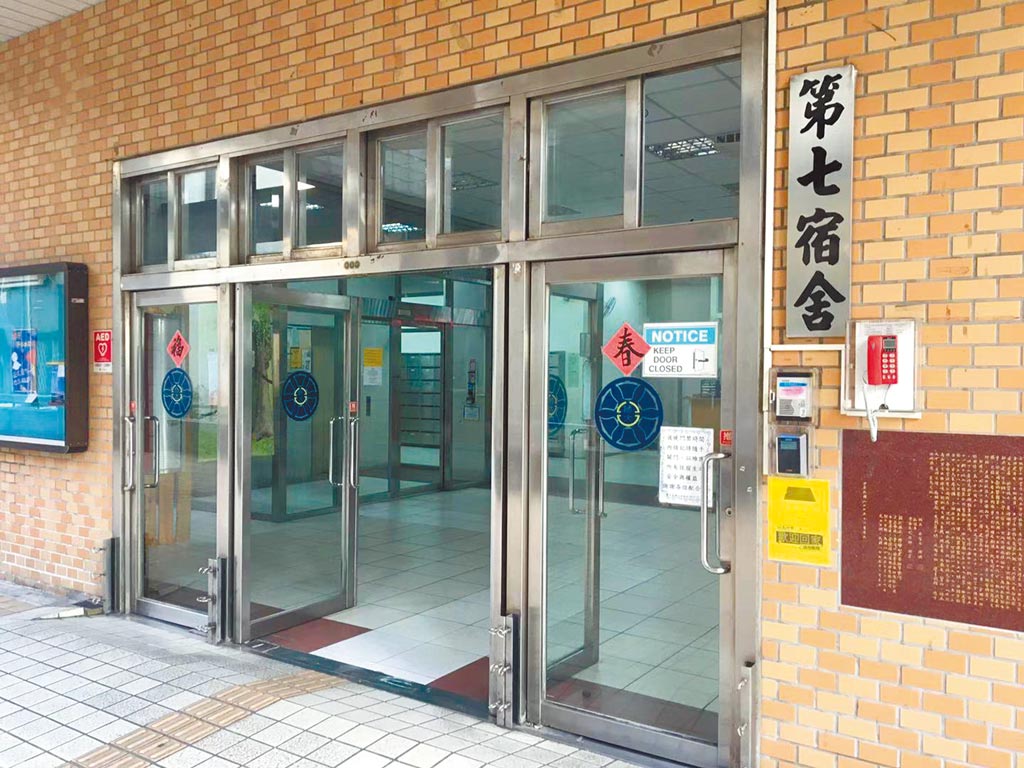
Seventh floor of the gender-friendly dormitory
5. There are currently eight gender-friendly restrooms in the university, and 27 more are expected to be added so that every academic building will have gender-friendly restroom facilities.
(Main Campus: 1st floor of the Lok Chi Building and 1st floor of the Education Building; Gongguan Campus: 1st floor of Building A of the College of Science; Linkou Campus: 1st floor of the Boya Building)
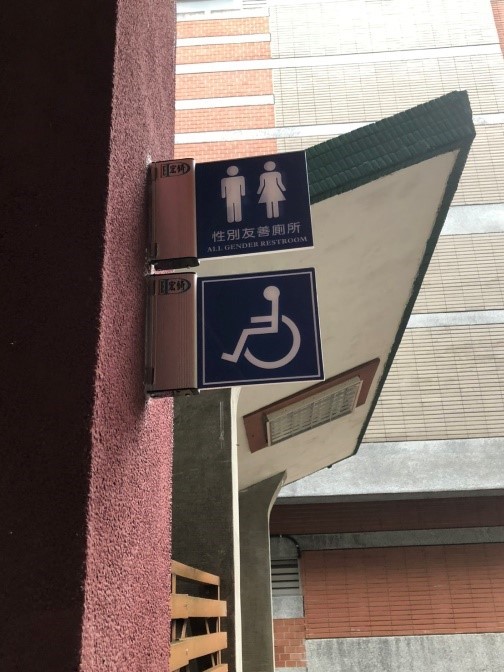
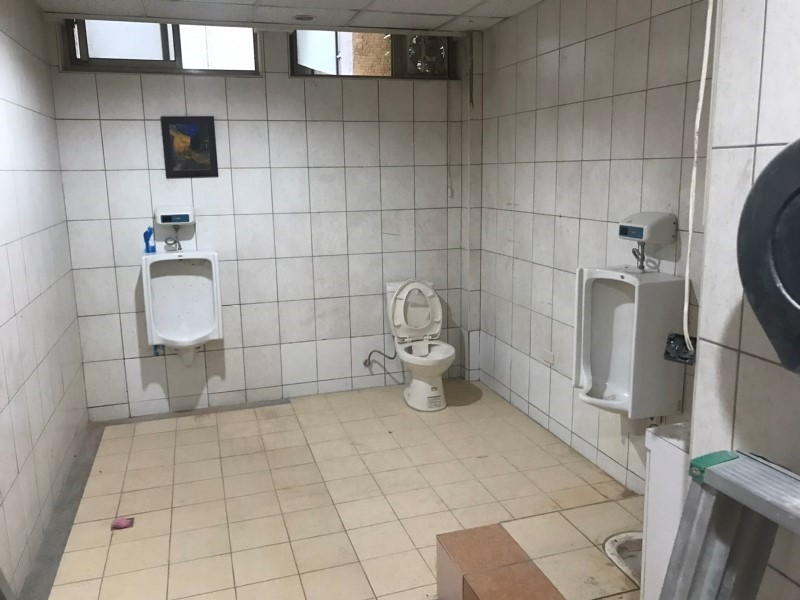
Gender-Friendly Toilets
6. Condom vending machines are set up, and occasional seminars on sex education and health concepts are regularly organized on campus.
5.6.3 Maternity Policy
1.With regard to the maternity policy for NNU faculty and staff, according to Article 15 of the 2022 Amendment to the Ministry of Labor’s “ Gender Equality in Work Act ” Announcement, NNU shall grant a maternity leave of forty-two (42) days after giving birth to a child, while employees of the Labor Standards Law shall be granted a leave of absence of seven (7) days prior to the birth of a child, and a leave of absence of eight (8) weeks after the birth of a child.
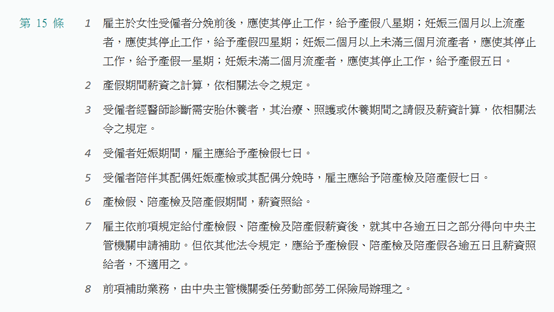
According to Article 7 of National Taiwan Normal University’s Gender Equality Education Implementation Guidelines, the university shall actively protect the right to work of pregnant faculty and staff and the right to education of pregnant students, and provide necessary assistance.

2.“Maternal Health Protection”: In accordance with Articles 30 and 31 of the Occupational Safety and Health Act, the Health Center implements the Maternal Health Protection Program to protect female workers who return to the workplace during pregnancy and after giving birth, and takes protective measures for jobs that pose a risk of maternal health hazards, so as to ensure that there is no risk to the health of mothers and babies and that their physical and mental conditions will not be affected, so as to enable female workers to realize their maternal health and equality in employment.
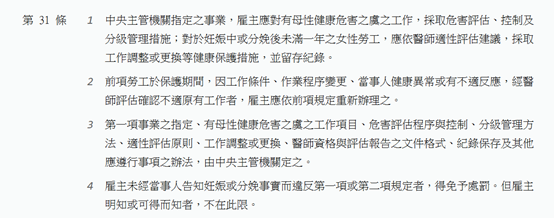
5.6.4 Student Child Care Facilities
1.According to Article 15 of the Gender Equality Education Act, schools should actively protect pregnant students’ right to education and provide necessary assistance.The school has formulated the “Measures for the Prevention and Handling of Sex Discrimination, Sexual Assault, Sexual Harassment or Sexual Bullying” to actively protect the educational rights of pregnant students and to assist pregnant students in their childcare needs after giving birth or giving birth to their children through referrals to the school or to the community.
2.Our school has contracted with four nursery schools/childcare centers as childcare providers. In addition, the Personnel Office also provides information on childcare centers near the school for female students who need to take care of their babies and young children in their vicinity, so as to facilitate female students to study at ease.
3. The school has four well-equipped and comfortable breastfeeding (and breastmilk collection) rooms located on the first floor of the main campus Lok Chi Building, the second floor of the School of Continuing Education and Extension on the Library Campus, the first floor of Building B of the College of Science on the Industrial Building Campus, and the first floor of the Wellness Center on the Lin Kou Campus.
4. School Safety Measures: Campus Safety Mobility Chart,Campus Police Station,Emergency Button Configuration Chart,Campus Safety Auxiliary Lighting.

5.6.5 Child Care Facilities for Staff
1. The University has signed a contract with four nursery schools, and the Personnel Office also provides information on childcare facilities near the school for staff to take care of their babies and children so that they can go to work with peace of mind. A childcare section is set up in the school’s Personnel Office.

2.There are four well-equipped and comfortable breastfeeding (and breastmilk collection) rooms located on the first floor of the Lok Chi Building at the main campus, on the second floor of the School of Continuing Education and Extension at the Library Campus, on the first floor of Building B of the Faculty of Science at the Kung Kwan Campus, and on the first floor of the Wellness Center at the Lam Hau Campus.
5.6.6 Women's Counseling Program
1.Counseling.
There are no gender restrictions, and both male and female students have access to our counseling resources and a dedicated website for the Psychological Counseling Center.
(1). Public lectures on gender equality at Burroughs University Hall.
(2). Provide 8-hour online courses on gender equality education for students and staff of the University.
2.Career Counseling.
The Center for Career Development provides career development counseling mechanisms for students at all levels, including career navigation, career development, job preparation and matchmaking, and career tracking. The University’s career development counseling resources are available to both male and female students. The total number of participants reached 3,735.
3.Industry Internships.
According to the information reported in the 112th year of the University’s database (internships from August 1, 2022, to July 31, 2023), 33 departments offered internships, 470 internships were offered, and 800 students (233 males and 567 females) were enrolled in internships.
4. Teacher Education Program Section: 2,239 female students enrolled in education programs, accounting for 60% of the total number of teacher education students.
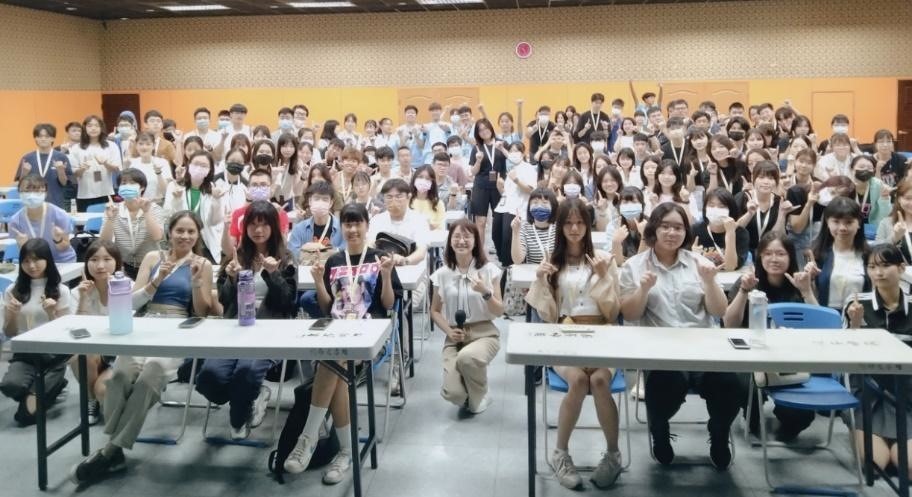
5.6.7 Tracking Female Graduation Rate
1. Our 5-year female graduation rate is tracked to be over 50%, which is higher than the male graduation rate.
In 2023, the female graduation rate will be 55.69%.
School Year 2018 | School Year 2019 | School Year 2020 | School Year 2021 | School Year 2022 | ||||||
Gender | Male | Female | Male | Female | Male | Female | Male | Female | Male | Female |
Number of people | 759 | 1038 | 781 | 1018 | 758 | 1039 | 741 | 989 | 787 | 989 |
proportions | 42.2% | 57.8% | 43.4% | 56.5% | 42.2% | 57.8% | 42.83% | 57.17% | 44.31% | 55.69% |

2. Revise the university’s academic regulations in 2022 to minimize factors affecting women’s graduation.
Many women in the master’s program, master’s in-service program, and doctoral program are in their 30’s. This is a critical time in their life planning. It is essential for them to avoid factors that may affect their educational opportunities and graduation, such as pregnancy, childbirth, or the raising of children under the age of three. Articles 15 and 57 of the Academic Regulations of National Taiwan Normal University stipulate that students may extend their studies for up to two years to minimize the possibility of pregnancy, childbirth, or parenting affecting a woman’s graduation.
5.6.8 Policy on protection of persons reporting discrimination
The National Taiwan Normal University’s “Regulations on Prevention and Handling of Sex Discrimination, Sexual Assault, Sexual Harassment, or Sexual Bullying”, which was set up in 2017 and has been amended several times, with the most recent amendment passed in 2022, clearly stipulates the obligation of confidentiality to the reporter in Article 18, and also stipulates confidentiality of the incident in Articles 11, 17, and 26 for the protection of those who report sex discrimination. In addition, the school’s standard operating procedures for gender incidents are listed in detail and posted on the school’s website, providing an open, reasonable, and legal standard operating procedure, which also stipulates the obligation of confidentiality for whistleblowers.
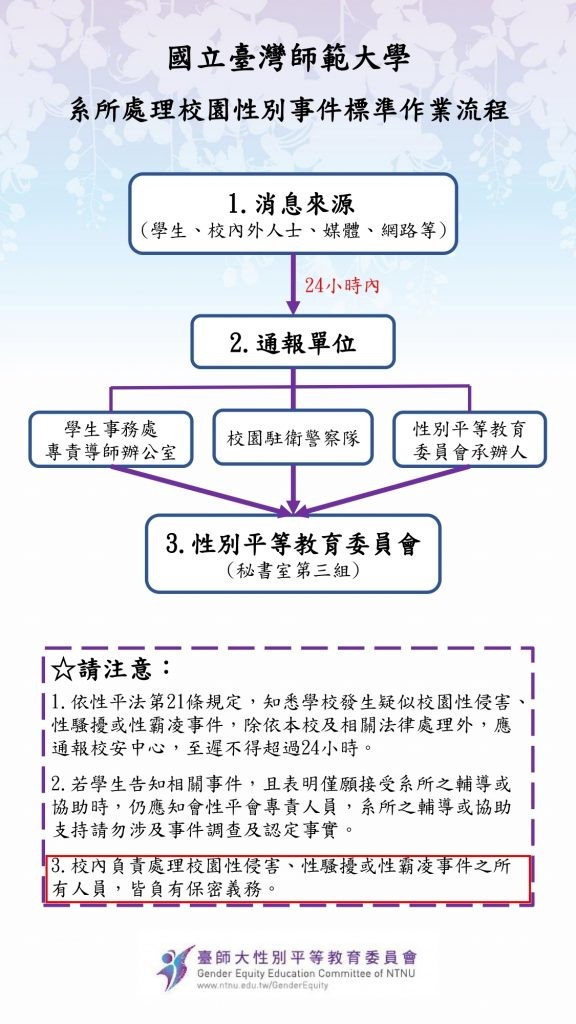
5.6.9 Paternity Policy
Based on the following two articles, the university executes a policy on paternity support for women’s participation to ensure that fathers can participate in child-rearing duties.
If an employee of the Labor Foundation has the fact and need to accompany his/her spouse during pregnancy and childbirth, he/she may apply for seven days of “ paternity leave ” in accordance with the newly amended provisions of Articles 5-7 of Article 15 of the Gender Equality in Work Act, and the leave may be calculated on an hourly basis.
- According to the new amendment to Article 7 of the “Regulations for the Implementation of the Gender Equality Act,” the period of leave for “paternity examination and paternity leave,” except for the leave for paternity examination, which can be taken during a spouse’s pregnancy, the leave for paternity leave shall be taken on the day of the delivery of the spouse and within fifteen days before and after the delivery of the child.


